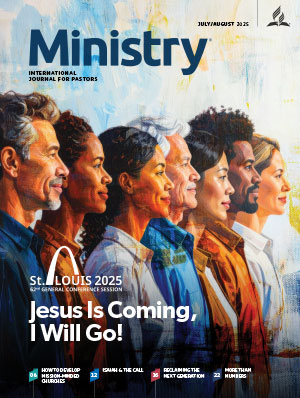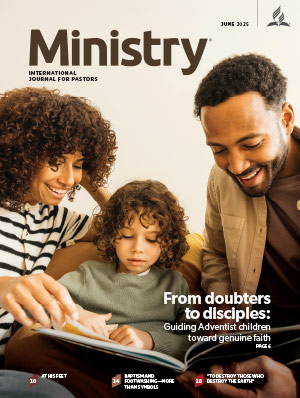The book of Isaiah is fascinating. Especially intriguing is the (so-called) call of Isaiah and its location in the book itself. Scholars have speculated about why the call of Isaiah is placed in chapter 6 rather than in chapter 1.1 Why? Though Isaiah 6 describes Isaiah’s call to ministry, a closer examination reveals more than just a prophet’s call. Isaiah 6 also brings in a prominent theme found throughout the book: judgment (cf. Isa. 1). Could it be, in fact, that Isaiah 6 is more about judgment than about Isaiah’s call?
Isaiah’s call
Except for Isaiah 53, more sermons have been preached on Isaiah 6 and Isaiah’s call than on any other passage in the book.2 Usually interpreted as revealing how God calls us to His mission field and often used to encourage preachers to follow God’s call in their lives,3 Isaiah 6 contains four components crucial to that call: know whom you serve; know your condition; know that you are forgiven; and, finally, through God’s grace, know what you can do.
Know whom you serve
Isaiah’s call came when the king of Judah died in 734 BC. Isaiah 6:1 says that King Uzziah is dead and that Isaiah then sees the real King of Judah, the Lord. King Uzziah did great things for Judah: he built towers in Jerusalem, he was a well-trained captain of the army, and he provided armaments. However, Uzziah’s pride brought his downfall when he offered incense in the temple, for which he was plagued by leprosy until death (see 2 Chron. 26).
Uzziah was well-respected, but after his death, God showed Isaiah the true King of Judah, who sat on His “high and lofty” throne (Isa. 6:1), whose robe filled the temple (v. 1), and whose glory filled the earth (v. 3). His sovereignty is demonstrated by showing that no one, and certainly no earthly king, is equal to Him. God revealed Himself to the people who had lost sight of Him, and He attested that, as the King of the universe, He takes care of His people.
The loss of the earthly king provided an opportunity to reveal the real King, whom they did not know.
The ox knows its owner,
and the donkey its master’s crib;
but Israel does not know,
my people do not understand
(Isa. 1:3, NRSV).4
The people of Judah attributed their success and power to their earthly king, but now Isaiah sees the true King, omnipotent and omniscient.
Know your condition
Now that Isaiah has seen the King of the universe and knows who is in charge of the world, he is faced with a question that all of us will ask at some point in our lives: What is my condition? Am I sinless or sinful? The question Who am I? entails more than just knowing where I come from; it is also a question of knowing my condition. In the first five chapters of Isaiah, the prophet proclaimed the condition of the inhabitants of Judah. He pointed out the people’s sins and shouted six woes to the people in chapter 5. Now Isaiah exclaims in a shocking exclamation, “ ‘Woe is me!’ ” (Isa. 6:5, NRSV).
This seventh woe is the apex of all the woes, revealing the condition both of the people who received the message from the prophet and of the prophet himself. In this case the prophet is not exempt from uncleanness even while proclaiming a message of woe to others. Isaiah, too, needs to know his condition. That condition is quite clear in the remainder of the verse: “I am cut off/destroyed! For I am a man of unclean lips, and I dwell in the midst of a people of unclean lips” (v. 5). His condition means that he cannot be in the presence of the royal King and should lose his life for being in the presence of the God of the universe. The “unclean lips” of the prophet reveal the condition of his heart (cf. Isa. 35:8; 52:1; Lam. 4:15) and utter the inconsistency of his being. These lips are unclean, suggesting unholiness. The term unclean is often found in the context of the book of Leviticus, in which it refers to the unholy. Thus, the lips of Isaiah are the opposite of God, the unholy opposing the holy. Do you know your condition?
Know that you are forgiven
Isaiah has learned whom he serves and his condition; next, he learned about forgiveness. Isaiah talks about forgiveness while giving his proclamation of coming judgment to the children of Judah in the first chapter. In Isaiah 6, however, this concept of forgiveness is directed toward Isaiah. This chapter continues its trajectory of focus on one individual to a crescendo.
In Isaiah 6:6 the flying seraphs reappear. This time one of the seraphs attended Isaiah rather than attending God, as in the first section of this chapter. The seraph flew purposely toward Isaiah; the preposition ’il (meaning to, toward) suggests a direction from one point to another point. Before we know why, we are told what the seraph has in his hand: a glowing coal.
This term for coal is used only once in Isaiah; however, it is used a few times in the remainder of the Old Testament with a variety of meanings. In Ezekiel 40:17, 18; 42:3 the same term occurs, but it is related to a “stone pavement” or “flagstone floor.” In 2 Chronicles 7:3 this term occurs when God appeared in the temple in the form of fire and people bowed their faces toward the “stone pavement.” Thus, the Hebrew word suggests something of a glowing color. In Isaiah 6:6 we can be certain that it is a live coal since it is taken from the altar (cf. 1 Kings 19:6).
The seraph touched the lips of Isaiah with the glowing coal and declared, “Behold, this has touched your lips, and your iniquity will depart and your sin will be atoned” (Isa. 6:7; cf. 22:14). This verse is at the center of the message of Isaiah 6 and concludes the first part, which consists of the heaven scene in the first seven verses. At this juncture we find that Isaiah is being forgiven: the lips are touched as a symbol of his heart or being, and those mortal lips are not pure enough to speak holy words (cf. Matt. 12:34; Luke 6:45). Then a two-part solution is declared: “iniquity will depart and your sin will be atoned” (Isa. 6:7). This suggests a total resolution of Isaiah’s sin: the iniquity is removed, and the sin is wiped off.5
The analogy reveals temple language, which demonstrates what happens to the sins of Israel. Here the sin of Isaiah is purged, and he is now able to proclaim a message from God that reveals His character of holiness. Thus, atonement is the representation of God’s holiness and what He does for His people. God wants to make His people like Him, with the same character. Do you know that you are forgiven?
Know what you can do—(Isaiah 6:8–13)
The second section of Isaiah 6 is about what Isaiah can do after learning who God is, knowing his condition, and knowing that he is forgiven. In verse 8 God speaks for the first time in this chapter. Isaiah had the privilege of seeing God, and now he hears the voice of God introducing the call of Isaiah. Two significant questions are asked: “Whom will I send?” and “Who will go for us?”
First, in this verse God uses a no-force approach; He simply asks questions and depends upon a totally voluntary response from human beings. As pastors we often work with volunteer church members, just as God works with volunteers and human beings with free will. But in contrast to God, humans tend to pressure others or coerce them into doing things for us. God does not bribe or coerce but expects our full trust that He will provide the necessities.
Second, these questions imply that God is the One doing the sending, not human beings sending for God. God is the One who convinces hearts, and He does so by having human beings encounter Him, know their condition, and know that they are forgiven. The sending follows naturally. The second question (“Who will go for us?”) also suggests that God empowers those who go because human beings go on behalf of God. God alone can give the necessary resources to do His work. Human skills and resources are inefficient in accomplishing what God is sending us to do. Only God’s methods will achieve His goal.
Third, these questions illustrate that God does not send volunteers out alone; He goes with them, accompanying those who are sent. Verses 9 and 10 show that they will face hardship, as not everyone will accept the message proclaimed, but God remains beside His messengers. Rejection does not mean that the message or the messenger is incompetent. The people who hear the message/messenger also have the free will to choose God or not; just as God asks for volunteers without coercion, He does not force anyone to accept His message.
Isaiah’s response to the question is favorable: “Here I am; send me” (v. 8). His willingness comes from his relationship with God and his gratitude to God for forgiving his sin. Isaiah’s renewal of heart comes first from walking with God, followed by a willingness to serve God. Isaiah’s call comes from seeing God and knowing who He is. Second, his call comes from realizing his condition. Third, his call comes from experiencing the forgiveness of his God. Only in this light is someone willing to respond to God’s call, “Whom will I send? And who will go for us?”
In the first part of verse 9, Isaiah’s positive response is followed by an immediate order: “Go, say to this people.” As soon as Isaiah was willing, God gave the order. In the book of Isaiah, the order does not come before the willingness of the servant, and the message that Isaiah proclaims comes from God and not from Isaiah. This message is found in the second part of verse 9 and in verse 10 and is more for Isaiah than the people.
God described to Isaiah how people would react to his message. He warned that people would not heed the message. But even when they did not, the messenger’s responsibility was to share it anyway. The heart of Isaiah is shocked by this task, and—like many other prophets—he asks the following question, as did most prophets when they were shocked: “How long, my Lord?” (v. 11).
Perhaps as expected when sharing a message from God, the initial response is not promising: “Until cities lie waste without inhabitants and houses without people, the land lies waste and desolate” (v. 11). Verse 12 says something similar, but verse 13 offers a message of hope: while many will reject the message of God, some will accept it and repent.
For this reason the children of Judah will continue the lineage of David from which the Messiah will come: “It shall be ravaged like the terebinth and the oak, of which stumps are left even when they are felled: its stump shall be a holy seed” (v. 13, NJPS; cf. Isa. 11:1–5). Do you know that God can take what’s left—God can take a stump—and use it for His glory?
By God’s grace
Isaiah 6 challenges us—particularly as pastors of the flock—to know whom we serve and for whom we speak. As God made Himself known to Isaiah, Isaiah learned a number of things. First, he sees this God as the true King of Judah and of the universe. Second, Isaiah discovers his condition, which is unholy before God, the same as the people of Judah. Third, he knows that his condition can be changed by God’s grace, which brings forgiveness. Finally, when Isaiah learns the previous three components, he knows what he can do for his Lord, and he is ready to do it.
Isaiah 6 remains relevant, especially for ministers of the gospel. We, too, are called to know our God; to know our spiritual condition; to know that, by God’s grace, we are forgiven; and finally, to know that God calls us to minister to His people.
- Joseph Blenkinsopp, Isaiah 1–39: A New Translation With Introduction and Commentary, The Anchor Bible, vol. 19 (New York, NY: Doubleday, 2000), 223.
- See John Oswalt, The Book of Isaiah, Chapters 1–39, The New International Commentary on the Old Testament (Grand Rapids, MI: Eerdmans, 1986), 172, 173.
- A Google search for sermons on Isaiah 6 finds many of them centered on the call of Isaiah. For example, see “Isaiah 6 Sermons: Embracing God’s Call and Vision,” Sermon Central, https://www.sermoncentral.com/sermons/scripture/sermons-on-isaiah-6be/?keyword=Isaiah+6.
- Unless noted otherwise, Scripture is the author’s translation.
- For more information how the concepts of “atone” and “sin” are used in the book of Leviticus, see Roy Gane, Cult and Character: Purification Offerings, Day of Atonement, and Theodicy (Winona Lake, IN: Eisenbrauns, 2005), 160, 161; 191–197; 217–302.











